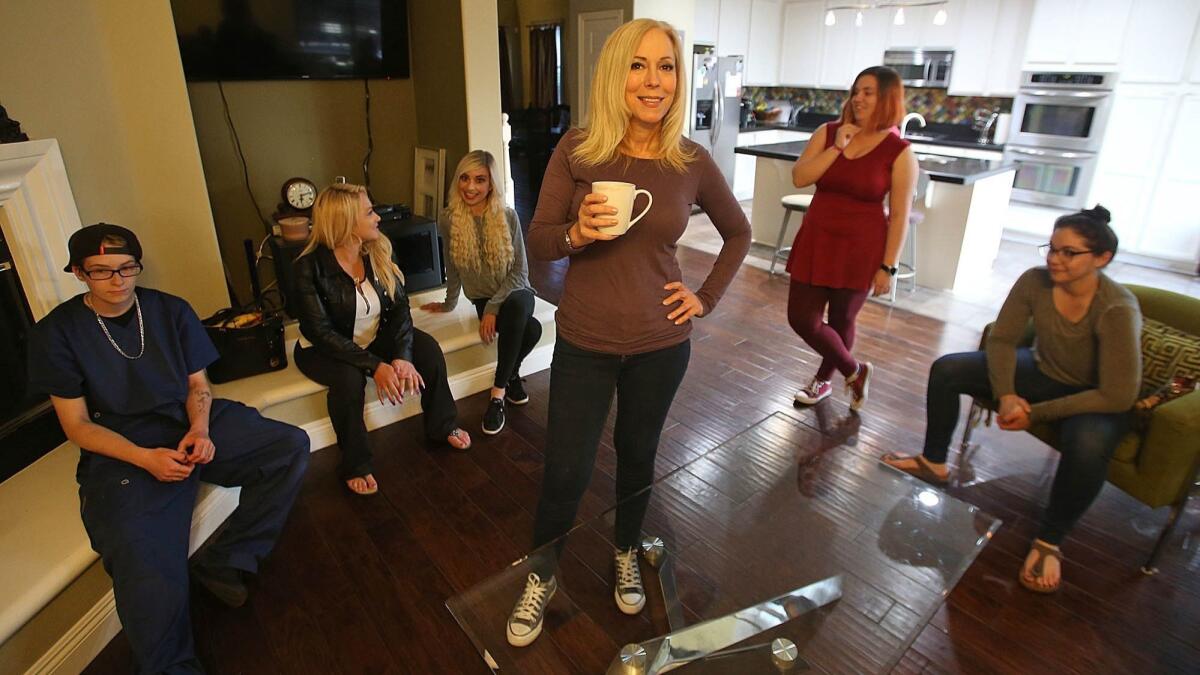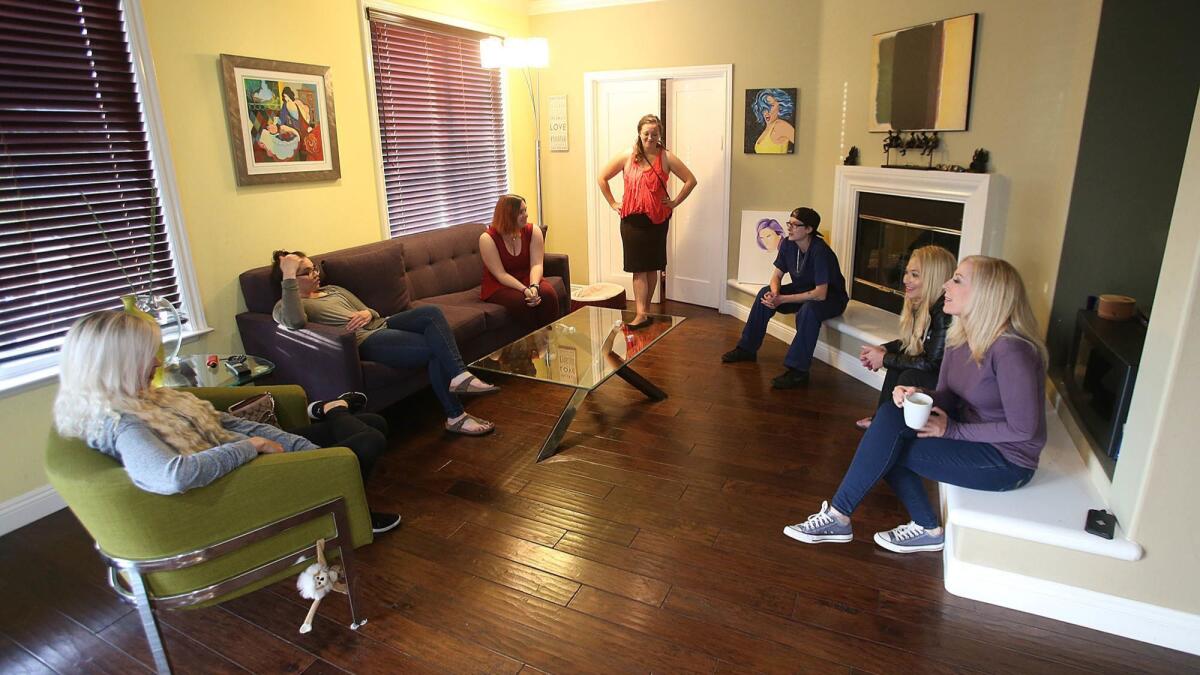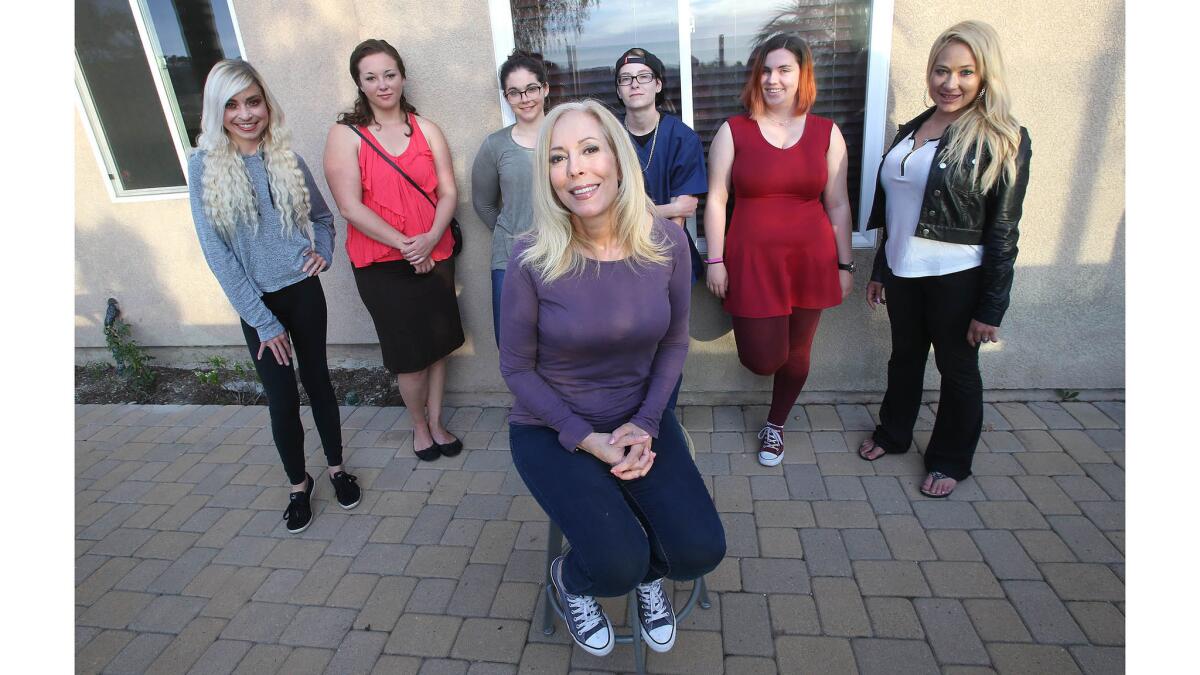Mission Viejo mom works to help foster girls get their lives back on track

- Share via
Lauri Burns had the most unlikely training for becoming a mother. In fact, she’s kind of like the St. Augustine of mothers.
As a child growing up in New York, Burns was beaten by her dad. Then, when her dad got caught beating her, he convinced the police she was the crazy one and she was locked away in a mental institution, where she was occasionally put in a straitjacket.
Burns busted out six months later and fled to Orange County, where her mother was living, and found solace in heroin and cocaine. Since heroin and cocaine cost money she started hooking on Harbor and Beach boulevards. By age 19 she had a baby girl named Summer. And by 22 that baby was taken away from her and placed in foster care. Burns stayed on the streets. Until one day when two men with a gun raped her and left her for dead on a dark canyon road.
This all happened before she turned 24.
After she was saved on the side of the road by a Good Samaritan driver, Burns saw the light. She went to rehab, got sober, enrolled in school to learn computer networking — and got her daughter back.
At age 26, Burns, by now climbing the corporate ladder on her way to a supervising position at Northrop Grumman, decided that the pain she went through happened for a reason: So that she could dedicate her life to helping other girls going through pain. Burns has since taken in 39 foster care children. And not the easy ones, either. But the cutters. The drug addicts. The kids who want to kill themselves.
Currently she has two foster kids living in her Mission Viejo home. One lost both her parents by the time she was 12. Now she works in a doctor’s office and is in school to be a nurse.
Not only does Burns feed these kids and clothe them, she tells them that they are strong and worth something and that she will stand by them no matter what.
“I don’t throw people away,” she tells them.

Janelle Hinshaw is one of the kids Burns has fostered. She has been Burns’ daughter for 10 years. Her biological mother abused her when she was a toddler. At 6, she was run down by a drunk driver, suffering multiple organ injuries, which led to countless surgeries. It didn’t lessen the abuse back home, though. Social Services finally took her away from her parents when she was 14, only to place her and her little sister with a group home mother who was a verbally abusive alcoholic.
At night she would cry.
“I remember asking God why I didn’t get a mom that would care for me. And I prayed that God would bless me and show me some kind of favor. I was praying for a real mom. I was so lost and alone,” Hinshaw says.
One Christmas Eve she called Social Services begging to be removed from the abusive home, which happened to be in Irvine. The social worker gave her a cell phone number for Burns.
Burns picked up the phone, and the next day Hinshaw and her sister were at Burns’ house, celebrating “Christmakah” (Burns is Jewish) with her other foster kids.
“It was like we were in a very dark space and she just had angel wings and took us home,” Hinshaw says. “I felt safe. It was like a ballet. It was beautiful.”
Hinshaw lived there for about five years until she went off to college.
“The moment I moved into her house it was an uphill walk,” Hinshaw says. “You get counseling and you get therapy. It’s ‘OK, we need a plan. What do you love? What are you good at? What will you thrive in?’”
Hinshaw got certified as an EMT within a year and today she is a health information analyst with a husband and a home in Mission Viejo.
In 2007, Burns started the Teen Project to help girls who wound up on the streets after their foster parents kicked them out when they turned 18. Three years later, the Teen Project opened a six-bed house in Lake Forest. It has since provided a transitional home for 77 girls. The girls can stay up to two years, during which time Burns puts them through vocational school and brings in volunteers to teach them life skills like cooking and budgeting.

Burns’ story has made headlines, landing her in People magazine and on Oprah’s website. It has also generated support from celebrities such as Mark Wahlberg, Will and Jada Smith and Bruce Willis.
In 2014, philanthropist Bill Johnson asked her if she would work with him to open a rehab home near Burbank. Freehab gets girls off the streets, off drugs and into schooling. So far 710 girls have passed through. The newest resident: A girl who jumped off a bridge in Pasadena last month, is paralyzed and has nowhere to go.
Social workers and therapists run Freehab (for $200,000 a month), but Burns tries to get to know all the girls. She is closer with the kids at the Teen Project house in Lake Forest. Every Wednesday they go to her home for dinner and she often shows up at their house with take-out Chinese food to watch TV.
“I know everything about those kids,” she says. “Are they getting good grades? Are they going to work on time? Are they making curfew?”
And if they’re not?
“I have a come-to-Jesus meeting with them,” Burns says. “I’m just like a regular mom.”
And just like a regular mom, she hands out chores and advice.
“Everything I know today about being a woman, about character and purpose, she had all those talks with me,” Hinshaw says. Then she laughs. “We had our mother and daughter fights, too.”
But Burns’ own traumatic past, and incredible comeback, earn her a respect that few other adults can command.
“She’s walked the same walk,” Hinshaw says. “She knows the horrible feeling of wanting to unzip yourself from your own skin.”
At the same time, she doesn’t wallow.
“She doesn’t let us mope around and feel sad about ourselves or be the victim,” Hinshaw says. “She’ll say: ‘You just need a new plan, girlfriend.’”
And possibly a shopping trip to Nordstrom.
“We get our nails done, go bowling, go to the beach — just regular family stuff,” Burns says.
“She wants us to feel like we aren’t foster kids,” Hinshaw says. “Like we’re not trash, but have worth and value. I’m probably going to cry now. I really love her. I’ll love her till the day I die.”
For more information on the Teen Project, go to theteenproject.com.
Lori Basheda is a contributor to Times Community News.
All the latest on Orange County from Orange County.
Get our free TimesOC newsletter.
You may occasionally receive promotional content from the Daily Pilot.



